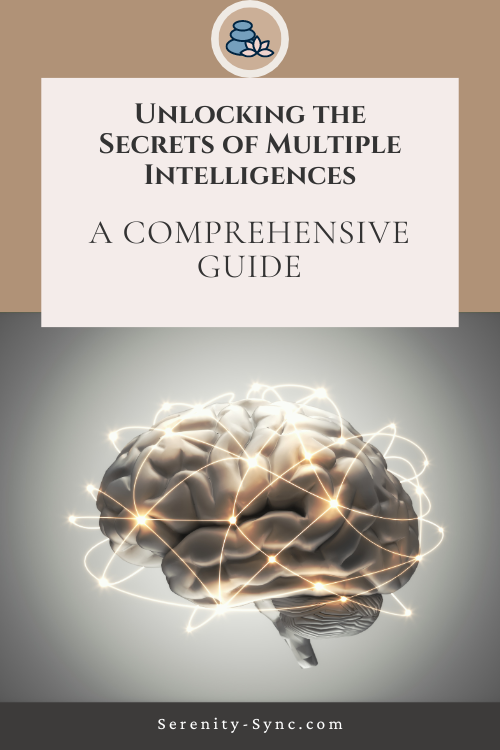In Brief
Discover the revolutionary theory of multiple intelligences proposed by Howard Gardner. This theory challenges the traditional view of intelligence and suggests that it is not limited to a single measure of cognitive ability. Instead, Gardner proposes eight distinct intelligences, each with its own set of abilities and potential. In this article, we will explore the criteria for identifying an intelligence modality, delve into each of the eight intelligences, and uncover Gardner’s insights on careers suited for each intelligence. Prepare to uncover the hidden talents within yourself and others!

Your Free PDF version of this blog post Awaits – No Strings, Just Click and Enjoy! 🌸🎁
Introduction to Multiple Intelligences
When we think of intelligence, we often imagine a single measure of cognitive ability. However, Howard Gardner, a renowned psychologist and Harvard professor, proposed a groundbreaking theory that challenges this conventional view. According to Gardner, intelligence is not a singular entity, but rather a combination of multiple intelligences.
Gardner’s theory suggests that there are eight distinct intelligences, each with its own set of abilities and potential. These intelligences include musical intelligence, spatial intelligence, linguistic intelligence, logical-mathematical intelligence, bodily-kinesthetic intelligence, interpersonal intelligence, intrapersonal intelligence, and naturalistic intelligence.
Unlike traditional IQ tests that focus primarily on logical-mathematical and linguistic intelligence, Gardner’s theory takes a more holistic approach to understanding the diverse range of human abilities and happiness. Each intelligence represents a unique way of processing information and interacting with the world.
Fun Fact
Leonardo da Vinci, Frank Lloyd Wright, and Zaha Hadid are notable figures who possessed exceptional spatial intelligence.
Criteria for Identifying an Intelligence Modality
How do we determine if someone possesses a particular intelligence modality? Gardner outlines three main criteria:
Brain Isolation Potential
Gardner argues that different intelligences can be isolated in the brain, suggesting that they are distinct mental abilities. For example, musical intelligence may involve specific neural pathways that are separate from those associated with linguistic intelligence.
Research in neuroscience has provided support for Gardner’s brain isolation potential. Studies using brain imaging techniques have shown that different intelligences activate different areas of the brain, further validating the existence of multiple intelligences.
Evolutionary History
Gardner believes that each intelligence has a unique evolutionary history, meaning they have developed over time to serve specific adaptive functions. For example, spatial intelligence may have evolved to help early humans navigate their environments and find food and shelter.
Examining the evolutionary history of each intelligence allows us to understand why certain abilities are more prominent in certain individuals and cultures. It also highlights the importance of embracing and nurturing a diverse range of intelligences within society.
Support from Experimental Psychology
Gardner’s theory of multiple intelligences is not just a hypothesis; it is backed by extensive research in experimental psychology. Studies have shown that individuals can excel in specific intelligences while performing averagely in others.
Experimental psychology provides valuable insights into how different intelligences can be identified and nurtured in educational settings. By recognizing and supporting individual strengths, educators can create inclusive and engaging learning environments for students of all intelligences.
Delving into the Eight Intelligences
Musical Intelligence
Do you find yourself humming along to every song you hear? Perhaps you have a natural talent for playing instruments or composing music. Musical intelligence encompasses the ability to understand, create, and appreciate rhythm, melody, and harmony.
Fun Fact: Did you know that musical intelligence isn’t just limited to playing instruments? People with musical intelligence can also excel in areas like sound engineering, composing jingles for commercials, and even creating unique sound effects for movies.
Spatial Intelligence
If you have a knack for visualizing objects in three-dimensional space or enjoy solving puzzles, you may possess a high level of spatial intelligence. Spatial intelligence involves the ability to perceive and manipulate visual and spatial information.
Individuals with spatial intelligence often excel in fields such as architecture, engineering, graphic design, and navigation.
Linguistic Intelligence
Do you have a way with words? Are you able to express yourself eloquently both in writing and speaking? If so, you likely possess a strong linguistic intelligence. This intelligence involves the ability to understand and use language effectively.
People with linguistic intelligence often pursue careers in writing, journalism, law, teaching, and public speaking.
Logical-Mathematical Intelligence
Are you a logical thinker who enjoys solving complex problems and working with numbers? Logical-mathematical intelligence involves the ability to reason, analyze, and think critically.
Individuals with this intelligence often thrive in fields such as mathematics, computer science, engineering, finance, and research.
Bodily-Kinesthetic Intelligence
If you have exceptional control over your body movements or excel in activities that require physical coordination, you likely possess a high level of bodily-kinesthetic intelligence. This intelligence involves the ability to use one’s body effectively and skillfully.
People with bodily-kinesthetic intelligence may pursue careers in sports, dance, acting, surgery, and physical therapy.
Interpersonal Intelligence
Are you a natural leader who excels at understanding and connecting with others? Interpersonal intelligence involves the ability to perceive and understand the emotions, motivations, and intentions of others.
Individuals with interpersonal intelligence often thrive in careers such as counseling, sales, coaching, politics, and social work.
Intrapersonal Intelligence
Do you have a deep understanding of yourself, your emotions, and your strengths? Intrapersonal intelligence involves the ability to reflect on one’s own thoughts and feelings.
People with intrapersonal intelligence often pursue careers in psychology, counseling, writing, and entrepreneurship.
Naturalistic Intelligence
Are you drawn to the natural world and have an ability to understand and categorize plants, animals, and other elements of the environment? Naturalistic intelligence involves the ability to recognize and classify patterns in nature.
Individuals with naturalistic intelligence may pursue careers in biology, ecology, environmental science, and conservation.
Careers Suited for Each Intelligence
Understanding the different intelligences can help individuals make more informed career choices that align with their strengths and interests. Here are some examples of careers suited for each intelligence:
- Musical Intelligence: Musician, composer, sound engineer, music therapist
- Spatial Intelligence: Architect, interior designer, urban planner, pilot
- Linguistic Intelligence: Writer, journalist, lawyer, translator
- Logical-Mathematical Intelligence: Scientist, mathematician, engineer, financial analyst
- Bodily-Kinesthetic Intelligence: Athlete, dancer, actor, surgeon
- Interpersonal Intelligence: Counselor, salesperson, coach, politician
- Intrapersonal Intelligence: Psychologist, life coach, author, entrepreneur
- Naturalistic Intelligence: Biologist, ecologist, park ranger, environmental educator
Unraveling the Intelligences: Key Facts and Explanations
Musical intelligence
Music has a special way of touching our souls, and those with musical intelligence have a deep connection to this art form. They possess a heightened sensitivity to sounds, rhythms, and melodies. Recognizing patterns in music comes naturally to them, making them skilled musicians and composers. Potential career paths for those with musical intelligence include becoming professional musicians, music producers, or sound engineers. Some famous individuals with musical intelligence include Mozart, Beethoven, and Stevie Wonder. Developing musical intelligence offers numerous benefits, such as improved memory, enhanced creativity, and increased emotional expression.
Spatial intelligence
Individuals with spatial intelligence have a remarkable ability to think visually and understand the relationships between objects in space. They excel in tasks that require mental manipulation of objects and have a keen sense of direction. Careers where spatial intelligence shines include architecture, engineering, and interior design. Notable examples of individuals with spatial intelligence include Leonardo da Vinci, Frank Lloyd Wright, and Zaha Hadid. Enhancing spatial intelligence can be achieved through practice and activities such as puzzles, drawing, and video games.
Linguistic intelligence
Linguistic intelligence encompasses mastery of language and effective communication. It goes beyond fluency in multiple languages and includes the ability to craft persuasive speeches, write compelling stories, and decipher intricate codes. Careers that harness linguistic intelligence include journalism, writing, and translation. Inspiring figures with linguistic intelligence include William Shakespeare, Maya Angelou, and J.K. Rowling. Strengthening linguistic intelligence can be achieved through activities like reading, writing, and participating in debates.
Logical-mathematical intelligence
Logical-mathematical intelligence involves analytical thinking and problem-solving abilities. Those with this intelligence excel in logical reasoning, mathematical proficiency, and scientific exploration. Fields and professions that value logical-mathematical intelligence include mathematics, computer science, and research. Brilliant minds with logical-mathematical intelligence include Albert Einstein, Ada Lovelace, and Isaac Newton. Cultivating logical-mathematical intelligence in everyday life can be achieved through activities such as puzzles, strategic games, and mathematical problem-solving.
Bodily-kinesthetic intelligence
Individuals with bodily-kinesthetic intelligence possess exceptional physical coordination and dexterity. They excel in activities that involve expressing ideas and emotions through movement, such as dance, sports, and acting. Career options for those with bodily-kinesthetic intelligence include professional athletes, dancers, and physical therapists. Celebrated individuals with bodily-kinesthetic intelligence include Michael Jordan, Misty Copeland, and Jackie Chan. Developing bodily-kinesthetic intelligence can be done through practice, physical exercise, and engaging in activities that involve body movement.
Gardner’s Insights on Careers Suited for Each Intelligence
Matching intelligences with fulfilling professions
Howard Gardner’s theory of multiple intelligences emphasizes the importance of matching individuals’ intelligences with careers that align with their strengths. By doing so, individuals can find fulfillment and excel in their chosen fields. This approach challenges the traditional notion that intelligence is solely measured by academic performance and IQ tests. Recognizing and nurturing a diverse range of talents in education and society is crucial for allowing all individuals to reach their full potential.
How different intelligences contribute to various careers
Each intelligence modality brings unique skills and perspectives to different careers. For example, those with musical intelligence can contribute to the music industry by creating beautiful compositions and performing captivating melodies. Individuals with spatial intelligence, on the other hand, can contribute to architecture and design by visualizing and bringing structures to life. Understanding how each intelligence can enhance specific careers helps in creating a more balanced and diverse workforce.
Encouraging a diverse range of talents in education and society
Gardner’s theory highlights the need for a holistic approach to education that recognizes and nurtures multiple intelligences. By acknowledging and encouraging a diverse range of talents, educators can create inclusive learning environments where all students can thrive. This approach also extends to society, where valuing different intelligences promotes innovation, collaboration, and a more comprehensive understanding of the world.
Conclusion
Howard Gardner’s theory of multiple intelligences has revolutionized our understanding of human potential. By recognizing and nurturing the unique intelligences within ourselves and others, we can unlock hidden talents and achieve greater fulfillment in our personal and professional lives. Whether you possess musical, spatial, linguistic, logical-mathematical, or bodily-kinesthetic intelligence, embrace your strengths and use them to make a positive impact in the world. Remember, intelligence is not limited to a single measure, but rather a rich tapestry of abilities waiting to be explored.
Fun Fact
Mozart, Beethoven, and Stevie Wonder are just a few examples of famous individuals with musical intelligence.

